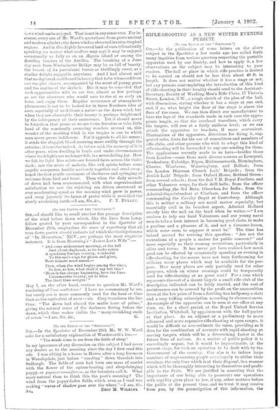[To THE EDITOR OF THE "SPECTATOR:'] SIR, — I should like to
recall another fine passage descriptive of the wind before dawn which, like the lines from Long- fellow quoted by your correspondent in the Spectator of December 28th, emphasises the sense of expectancy that all
true dawn poetry should indicate (of which the closing stanzas of "In Memoriam," NOV., are perhaps the most exquisite instance). It is from Browning's " James Lee's Wife " :— " And some midsummer morning, at the lull
Just shout daybreak, as he looks across A sparkling foreign country, wonderful To the sea's edge for gloom and gloss, Next minute must annul,— Then, when the wind begins among the vines, So low, so low, what shall it say but this ?
'Here is the change beginning, here the lines Circumscribe beauty, set to bliss The limit time assigns."
May I, on the other hand, venture to question Mr. Ward's rendering of Vora mattutina I have no commentary by me, but surely one is more commonly used for the hour or time than as the equivalent of aura air. Cary translates the line
thus: "The dawn had chased the matin hour of prime," giving the natural sense of the darkness fleeing before the dawn, which thus makes visible the " many-twinkling smile






































 Previous page
Previous page